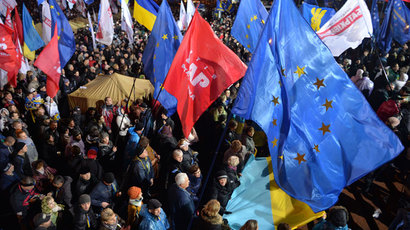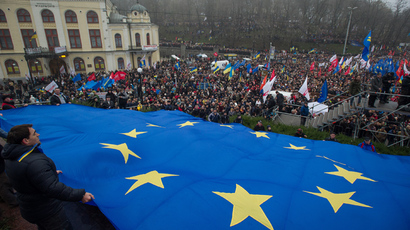‘Another president may sign it’: EU eyes Ukraine opposition as Kiev rejects trade deal
Ukraine has rejected a key integration deal with Europe. The EU ‘keeps the door open’ for Kiev, but doubts it would happen under the current government. It comes as opposition holds thousands-strong protests against the rejection.
The deal was rejected on Friday in the Lithuanian capital, Vilnius, where European leaders have gathered. Unlike Moldova, Azerbaijan and Georgia, which initialed association agreements with the EU, Ukraine stuck to its decision not to integrate with the union.
Even after announcing that there would be no deal, Ukrainian President Victor Yanukovich went to the summit to personally explain his government’s move. He said it would be too painful for Ukrainian economy at present.
Kiev wants to integrate into the EU, but is not ready to do it at the moment even after four years of preparations.
“[Softening the economic blow] requires our joint work on a program of economic aid to Ukraine, which will allow us to implement the preparation for the signing of the agreement. We believe such a program should be the result of a joint effort by Ukraine and the EU,” Yanukovich said on Friday.
Lithuanian President Dalia Grybauskaite, whose country currently holds the rotating EU presidency and who was among the most vocal proponents of the Eastern Partnership integration project, didn’t take long in dismissing Yanukovich’s requests.
“The Ukrainian elite, Ukrainian government could have changed their approach. The European Union will not bargain anymore. All the main terms [of the agreement] are well-known. There will be no additional terms,” she said.
“The EU still supports the intention of the Ukrainian people to become closer with Europe, but the Ukrainian authorities have to a large extent lost the EU’s trust,” Grybauskaite added.
In addition to the aid, the Ukrainian president requested that the EU settle its differences with Russia over Ukrainian integration through trilateral talks, a request that Europe has been strongly rejecting.
“We are talking about bilateral agreement between the EU and Ukraine. How can we involve a third country in it? We cannot allow a third to have a veto,” President of the European Commission José Manuel Barroso said.

The scolding remarks are a sign of disappointment with Ukraine’s U-turn, which the Lithuanian president described as “choosing a road to nowhere” on Tuesday following a meeting between Yanukovich and European leaders.
Even as the meeting was about to start, EU leaders were not hiding that they have little hope of convincing Yanukovich to reconsider.
“We will make very clear here that the EU is ready to accept Ukraine as an associate member, to sign the association treaty. Then we will see. We have no hope that it will happen this time, but the door is open,” German Chancellor Angela Merkel said.
Apparently the door will have to remain open for some time, until there is a new government in Kiev.
“What’s very certain is that the president of a country isn’t the country,” EU parliament President Martin Schulz said before the meeting. “One can agree with Yanukovich or not. Maybe another government with another orientation will come to power.”
EU Council President Herman Van Rompuy has called the EU’s offer “the most ambitious” proposed to a non-member. Despite Ukraine’s decision, Rompuy said, the summit was successful.
“The European Union’s position [over Ukraine] remains clear. The offer of signing the most ambitious agreement the EU has ever offered to a non-member state is still on the table,” he said.
Rompuy stressed that the EU is ready to resume negotiations with Ukraine at “any moment”.
Streets to the rescue?
The next presidential election in Ukraine is to be held in 2015, but the country’s recent history saw a vivid example of how a government can collapse under a pressure from the streets. The same Yanukovich was called the winner of the 2004 elections, but was forced out by the crowds supporting his main competitor.
The past experience of the Orange Revolution lingers over Ukraine now, as tens of thousands of people gather in the streets to protest against the government. Tens of thousands of people have gathered in Kiev to protest both for and against Yanukovich.
Pro-EU integration protesters, many of whom are students, have linked hands to form a human chain. Organizers said the “chain” should link Ukrainian cities and eventually reach the Polish border as a symbol of unity with the EU.

The ambitious feat would require some 522,000 people, according to the organizers’ initial estimate, a figure which skeptics say they have no hope of mustering.
Anti-government protesters also called on Washington to pressure their government. An online petition on the White House website asking the US to issue travel ban on top Ukraine government officials unless Yanukovich signs the deal with the EU has gathered over 75,000 signatures.
The mass demonstrations, which started last week after the government first announced the decision, have been mostly peaceful. But on several occasions groups of aggressive activists armed with pepper spray clashed with Ukrainian riot police. There were also some calls on the internet for a takeover of government buildings, which prompted police to warn the protesters against such moves.

Cost doubts
Kiev’s main argument against the trade agreement was that it would cost too much. While the $830 million figure that Yanukovich voiced drew some skeptical comments from the Europeans, EU officials admit that without the union’s help Kiev would find it hard to adapt to greater openness of its market.
But Europe is not in the best economic shape and is not prepared to shoulder Ukraine as much as it would like it to.
Ordinary Europeans “are very uncomfortable with the idea of Ukraine coming to the EU. The EU right now is bankrupt with the crisis in the PIGS countries – Portugal, Italy, Greece and so forth” geopolitical analyst William Engdahl told RT. “They don’t have money to do anything positive for Ukraine. The only thing they can do is to try to take advantage of the weakness of Ukraine.”
One of the reasons why Ukraine’s integration with the EU would cost so much is that the move would leave it barred from its traditional Russian markets. Moscow warned that it would not keep export preferences with Ukraine after it signs free trade agreements with EU, because it would effectively open the Russian market to European goods.
EU officials are branding Russia’s position as harsh economic pressure and say it was due to that pressure that Kiev rejected the trade deal. Moscow accuses Brussels of politicizing a purely economic issue and says the Europeans are the ones pressuring Ukraine into signing an unfavorable deal.

The head of Russia’s State Duma Foreign Affairs Committee, Aleksey Pushkov, has predicted that the EU will not support Yanukovich in the next presidential elections, saying the Union now “counts on” the opposition.
“The signal is clear: on the threshold of Ukraine’s 2015 elections the EU counts on the opposition and is already preparing a replacement for Yanukovich. Expect new Maidans [referring to protests at Kiev’s Independence Square (Maidan Nezalezhnosti)],” Pushkov posted on his Twitter page.














